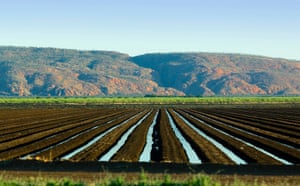NFF submission to Finkel review joins AGL, Energy Australia and Business Council in supporting mechanism such as emissions intensity scheme

A water irrigation system in Kununurra, Western Australia. The National Farmers’ Federation has called for a market-based mechanism to secure clean and affordable energy.
Photograph: Bloomberg/Getty Images
The National Farmers’ Federation has called for a market-based mechanism to secure clean and affordable energy, such as an emissions intensity scheme, joining a long list of organisations urging an end to Australia’s policy impasse.
In a submission to the Finkel review, the NFF calls for the government to reconsider its opposition to an EIS and institute a market-based mechanism by 2020 because it would be the cheapest path to low-emissions power generation.
The NFF joins many organisations calling for consideration of a market mechanism including network company Energy Networks Australia, retailer Energy Australia, electricity provider AGL, the Climate Change Authority, the Business Council of Australia and the CSIRO.
The chief scientist, Alan Finkel, has also given implicit support for an emissions intensity scheme, saying it would integrate best “with the electricity market’s pricing and risk management framework” and “had the lowest economic costs and the lowest impact on electricity prices”.
In December the energy and environment minister, Josh Frydenberg, ruled out pursuing an EIS, pre-empting the findings of the Finkel report by taking one of the most widely supported policies to meet Paris climate targets off the table.
On Tuesday the NFF president, Fiona Simson, told ABC’s AM the current system was “broken”, citing blackouts in South Australia and poor energy reliability and affordability in the agricultural sector.
Simson said some farmers faced power bills of double or triple the rates in previous years, labelling price spikes “indefensible”.
“In agriculture it’s absolutely devastating – we have businesses that rely on secure, reliable and affordable electricity to conduct cool stores that store fruit, for example, that run their milking machines for their cows, that run irrigation pumps for their fruit and their vegetables.”
Simson said that an evidence-based policy would result in “the market sorting it out” and called for a technology neutral approach.
An emissions intensity scheme is part of Labor’s climate change policy and has been backed by the South Australian government, which the Coalition has used to revive a scare campaign about power prices despite findings that policy stability can reduce prices.
The Turnbull government has claimed to be pursuing a technology-neutral approach to energy despite senior ministers calling for new coal power plants and considering direct government subsidies or changing the rules of the Clean Energy Finance Corporation to build them.
Simson said energy security and affordability should receive bipartisan support and “we don’t want it to become a political football”.
The NFF president said if Finkel were given the latitude to conduct a wide-ranging review that could help overcome the policy impasse.
“Initially when [the federal government] announced their review we were delighted that everything was put on the table.”
Simson said the NFF didn’t favour any particular market mechanism, saying it could include an EIS or a renewable energy target with different parameters.
“We need to look at the evidence – it may not be that an EIS is what the [Finkel] review comes up with,” she said. “However, I would urge the prime minister to look at the evidence that is produced by the review and to take heed of the review.”
Finkel is expected present his final report to the Council of Australian Governments by mid year.










